Wednesday, February 28, 2024 – Volume 36 Issue 17
TCC has made progress in integrating stronger internet access with the Wireless Technology Expansion Project.
In the Feb. 22 board meeting, trustees approved an action item that would transfer funding for the previously planned growth of Wireless Access Point infrastructure, starting in 2021. WAPs are network devices meant to connect wireless
devices to the internet. This will also include Wi-Fi enabled calling.
Todd Kreuger, chief information officer, stressed that the efficiency of the network is a priority to the college and is making efforts to ensure students have the access they need.
“Reliable and appropriately robust wireless technology is critical to student success, to student experience and to student safety,” he said at the Feb. 15 work session.
This means that if a student ends up in a compromising position, Kreuger said that the Wi-Fi
enabled calling could help sideline the possibility of a student being somewhere that they cannot connect through their cell.
The transferred amount in the action item was $4,357,210 from the Operations and Maintenance Fund balance to the Technology Capital Fund balance. Originally, the amount of WAPs was calculated based on square footage. This assessment was made by General Datatech LP, who recommended adding newer WAPs.
The current progress of the
See Wi-Fi, Page 2
@tccthecollegian • collegian.tccd.edu
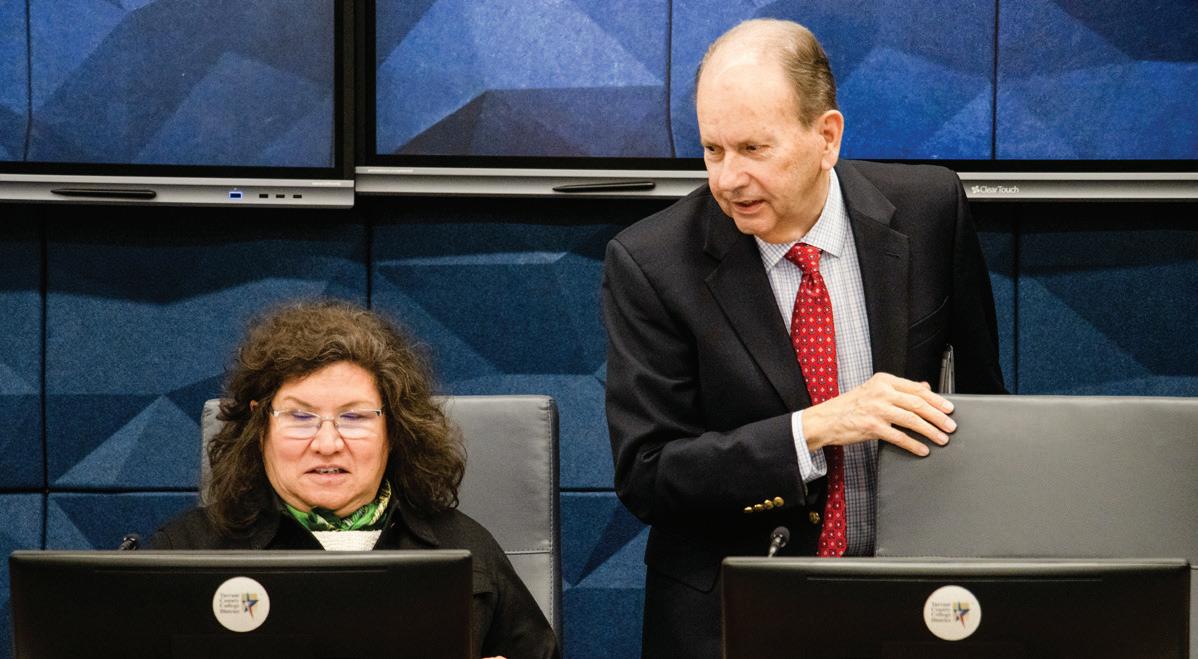
NINA BANKS managing editor nina.banks@my.tccd.edu
Riley Hylkema’s celebration of choice is grabbing a cookies and cream milkshake — the only good flavor, he says — with some friends. Lately, he has had a lot of celebrating to do.
The Keller High School senior won the Tarrant County Orchestra Young Musicians Concerto Competition back in December.
“It was exhilarating,” Hylkema said. “It was an awesome feeling. But at the same time, I was really, really excited. My heart rate was through the roof.”
Hylkema began playing the violin in kindergarten. In the
sixth grade, he met Adam Pratt, head director of the Keller Orchestra program. Pratt gave him two choices: Stick with violin or try a new instrument. He chose the latter and picked up the cello. There were several factors behind the change. For one, he wanted the chance to try something new. But most importantly, it sounded nicer than violin, he said.
He’s been stuck with the cello since then and has excelled at it. Hylkema, the principal cellist of the Keller High School varsity orchestra, made history in Keller ISD by becoming the first cellist to make the TMEA Region 2 All-Region Orchestra. Outside of school, he has been a member of the TCO for three years. See Concerto, Page 2
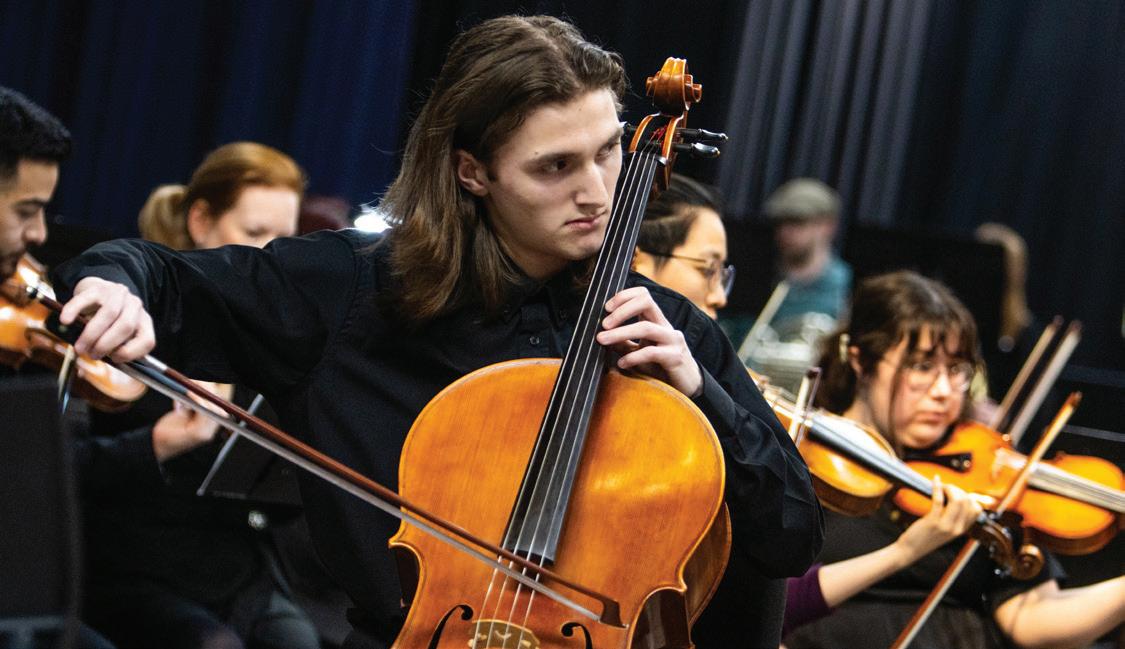
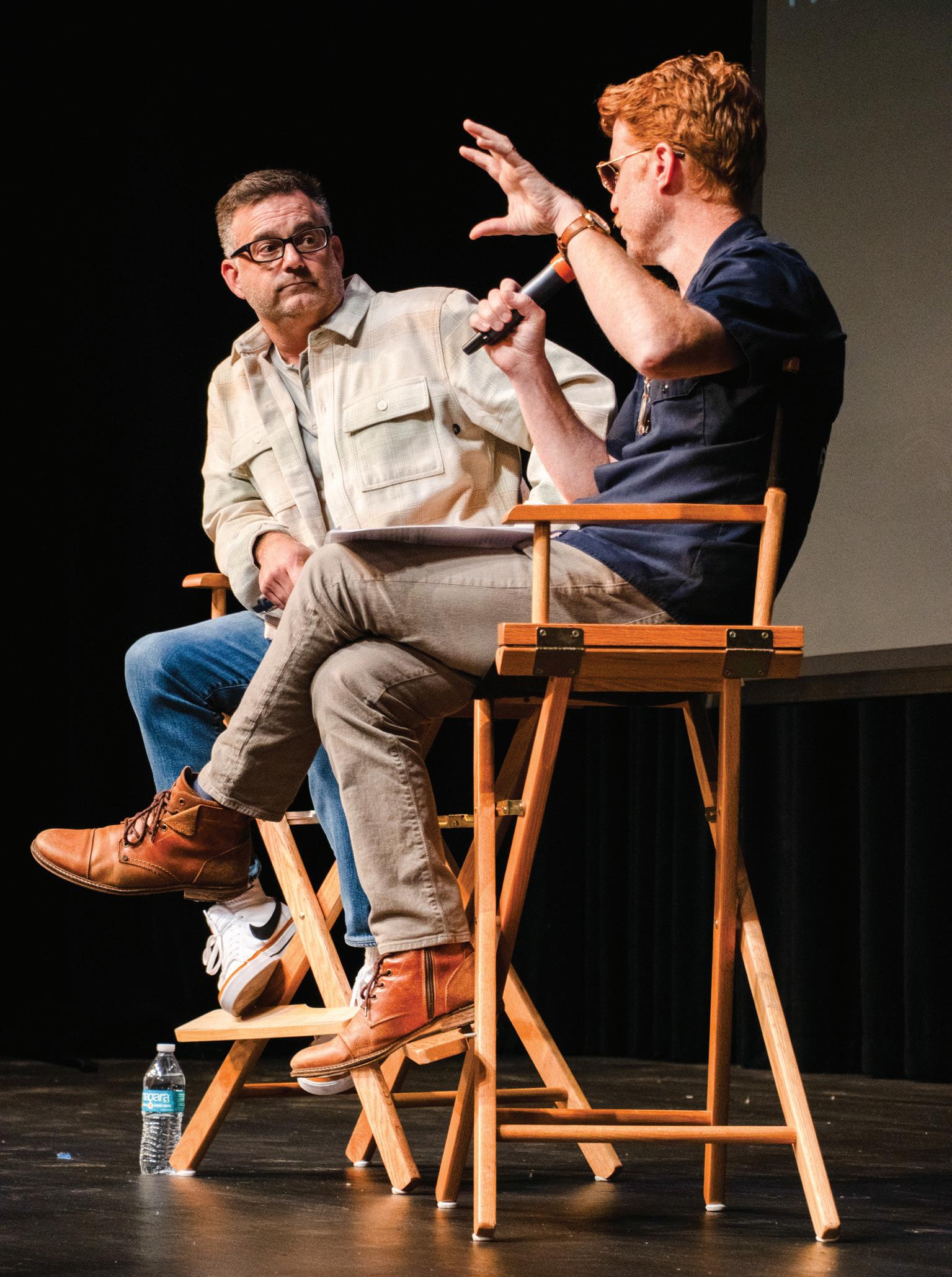
XAVIER BOATNER &
The story of an enigmatic woman who questions the extent of her inheritance is being given new life thanks to TCC.
David Auburn’s “Proof,” a Pulitzer Prize-winning stage play, is coming to NE campus on Mar. 6 at 7 p.m. The NE Playhouse is set to tell the tale of Catherine, a curious daughter on a mission to explore the nature of her genius and examine the world of mathematics through the eyes of intelligent women.
Jakie Cabe, associate drama professor stage play director, said
one of the most intriguing parts of the plot is how it manages to walk the fine line between madness and brilliance.
“The story walks the fine line between brilliance and madness,” Cabe said. “It centers around a father and daughter, and the father was a mathematical genius and professor. Some cast members, like NE student Alexis Harrison, who plays Claire, felt similarly about the play, and the way it examined the line between the two concepts, as well as other dynamics. “I really liked the father daughter dynamic of the play,” she said. “I was drawn to it. I was
See Proof, Page 3
The Fort Worth Film
Collaborative rolled out the red carpet for the event that introduced a new fast-tracked program.
ing to break into the production side of film.” she said. I want to write and direct someday. But I’m really interested in getting to know how all of it works. There’re so many parts of it.”
Former RTVB student Daniel Vera works at Lowtown Studios as a marketing intern and wished the new certification program was available when he was a student. “It’s really exciting to see all these people come together, not only film production companies, studios, rental places, the Film Commission itself,” he said. “I just see the industry booming, and I’m just beyond stoked to be able to see it happening.”
Students are seeking dif-
ferent ways to connect with other creators on campus and in the production industry.
“I feel like we’re all looking for somebody to work with,” said NE student Bethany Anthony. “We all need to be a team in order to make any of our dreams a reality.”
As the scope of the film industry grows, so does the number of doors that have begun opening for aspiring film students.
David Glasser from 101 Studios spoke about the program and why it is crucial in helping studios find more state-trained workers so shows can continue to be made in North Texas. “We need more jobs,”
See Film, Page 4
Transfer Center Opportunities and resources are available at transfer events Page 2 “Griselda” This series tackles issues in sexism and drug abuse Page 5 “Bob Marley” Kingsley Ben-Adir’s interpretation touches on Marley’s reality Page 5 Breakups The beginning may be hard, but the recovery is worth it Page 7 Beyoncé’s country song Beyoncé deserves a place in the boot-scoot-boogie world Page 5
Alex Hoben/The Collegian High school student Riley Hylkema starting playing the cello in first grade. He performed a cello solo during the concerto.
XAVIER BOATNER campus editor xavier.boatner@my.tccd.edu
Alex Hoben/The Collegian
101 Studios production executive John Hermansen and president and producer of Red Productions Red Sanders speak about the film collaborative during panel.
FOUSIA
ABDULLAHUI campus editors collegian.editor@tccd.edu
The event also featured meet-and-greet tables with production companies. These companies included 101 Studios, MPS Studios, Panavision, Red Productions, Backlot Studios, Lowtown Studios and the Lone Star Film Society. TCC student Hannah Bohnert found out about the event on Instagram and decided to come out to network. “I have a background in technical theater, so I’m tryHOPE SMITH editor-in-chief hope.smith393@my.tccd.edu
Collegian
Alex Hoben/The
NORTHEAST DISTRICT DISTRICT Efforts persist for improved Wi-Fi access Two-year plan will give campuses updated Wireless Access Points NORTHEAST Wokeness - Students discuss the evolution of the word “woke” Page 6 Hollywood brings jobs to TCC film students NE production deals with mourning, math Keller cellist hits all the right notes
Teresa Ayala and Kenneth Barr discuss the meeting agenda.
“He has continually gotten better — especially since he got into high school,” Pratt said. “He’s just really, really taken off. And the only thing I can equate is just striving to get better.”
Hylkema was at a routine cello lesson with NE music professor Hsinyi Wang when she mentioned the concerto competition. Entrants were required to perform a 10-minute solo from memory. The prize: playing a concerto with the full ensemble at their next concert.
Luckily, Hylkema had been working on Edward Elgar’s Concerto for Cello and Orchestra, Opus 85 for the past year. The piece consists of four movements and is 30 minutes long when played in its entirety. For the competition, he settled on the fourth movement.
“Somehow, the piece was very natural for him,” Wang said. “He was very natural picking up the emotional changes, the colors and the chords from music and transforming that into playing — which was very delightful to find out.
Five students signed up. TCO director and NE adjunct music professor Bryan English adjudicated the competition.

“He knew the piece. He played great,” English said. “He’s got great chops for this kind of repertoire.”
The next week was TCO’s holiday concert. Right before their final piece, English announced Hylkema won the competition.
The weeks following required heavy practice in preparation for the next concert, where he would perform his concerto. Hylkema decided to perform the piece he auditioned with. One of the challenging parts was learning to play like a soloist, he said.
“I’m technically playing at an orchestra,” he said. “I’m not playing with an orchestra. I need to be able to project my sound and learn how to do that. And that took honestly the longest amount of time to figure out how to play at that level.”
In the days leading up to his big solo, he received some advice from Pratt, drawing from a similar situation he experienced in college.
“He’s like ‘You’ve already put in the work — you’ve put in the work for the last year,’” Hylkema said. “He’s like, ‘This is your time to shine. Go have fun, enjoy yourself.’”
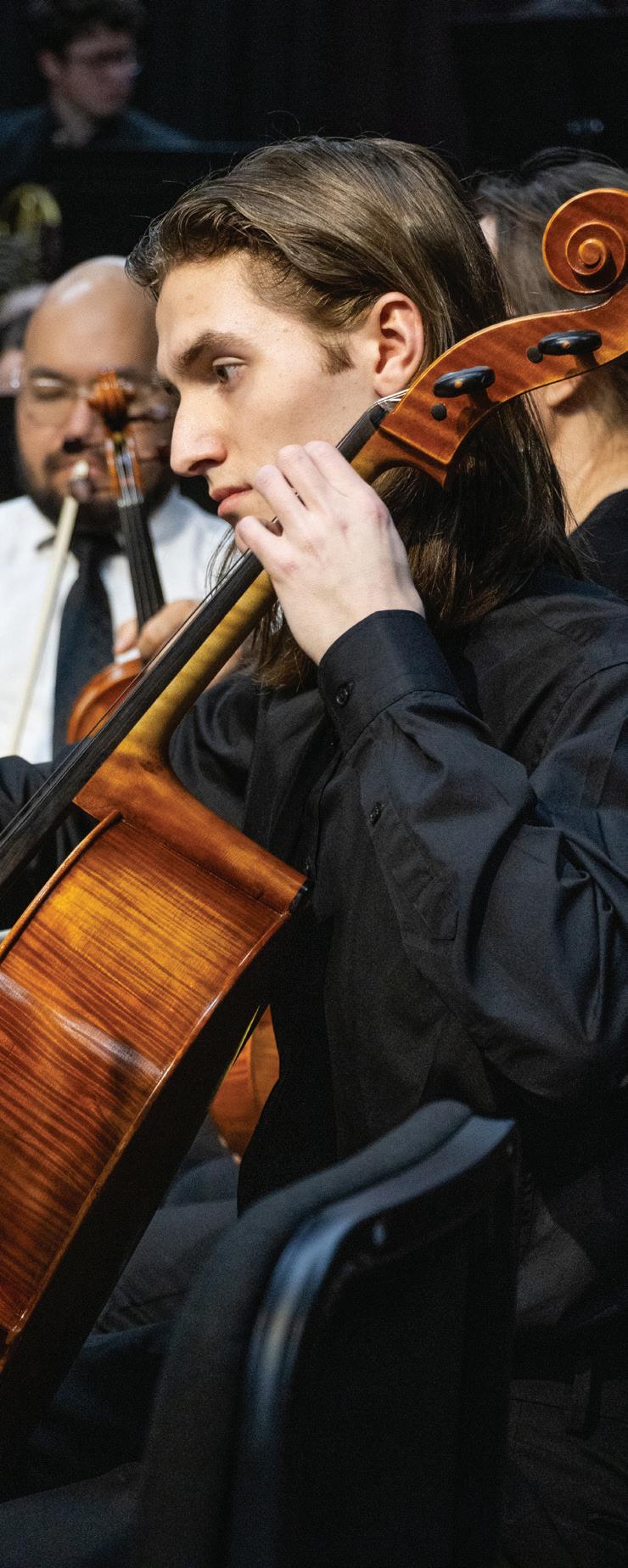
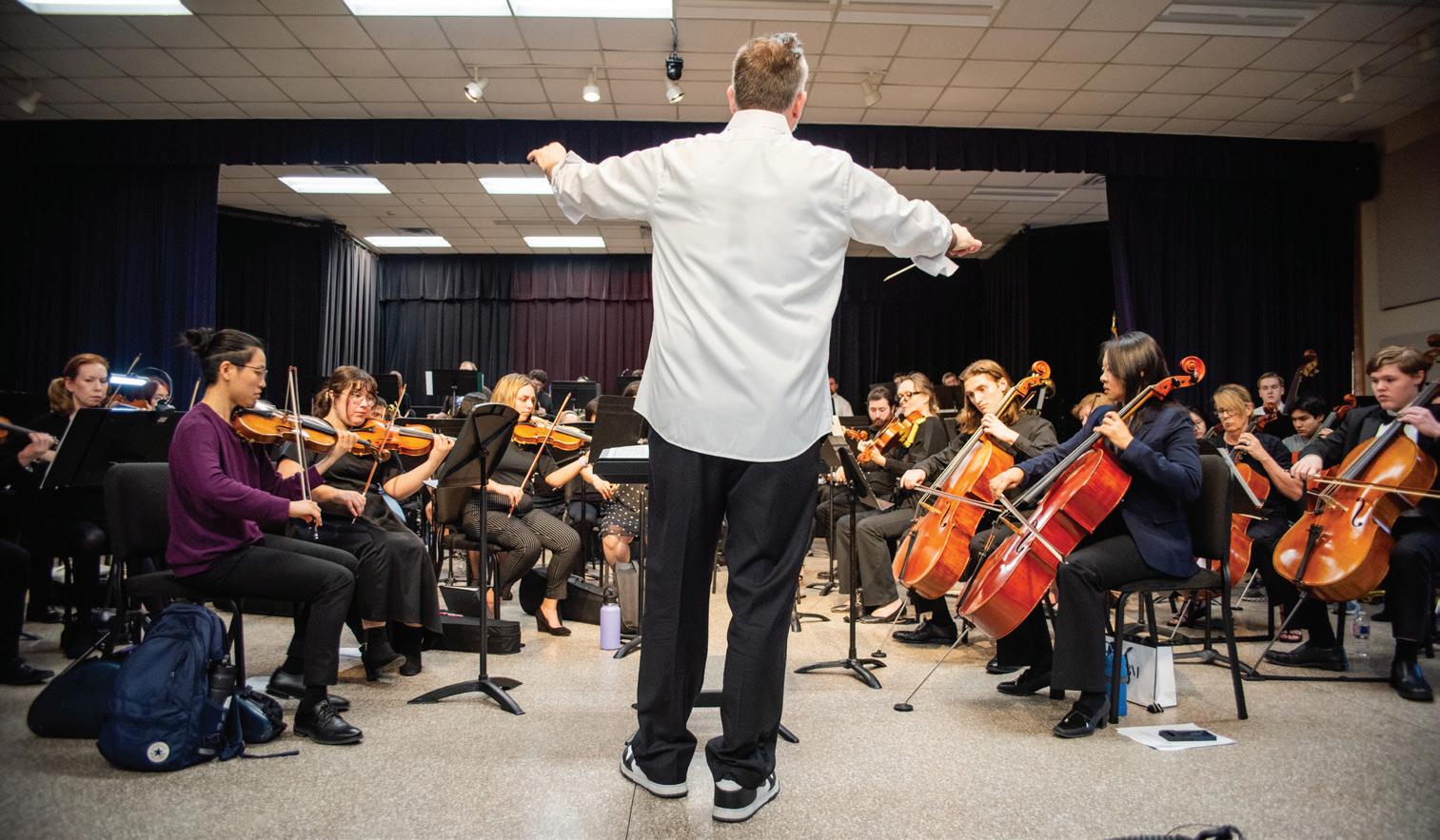
NE Transfer Center hosts universities
Event offers transfer applications
hosts. Representatives from several four-year colleges assisted students with their admissions applications and answered questions about the transfer process.
to the presentation from the work session.
Kreuger explained that the issues students may be experiencing with the Wi-Fi come from the fact that they might not connecting to the right Wi-Fi network. If someone connects to TCCD-Public, they will be automatically logged off after
four hours. The recommended network is TCCD, and Kreuger said that the current users of TCCD-Public have been cut in half.
Designating the money to the fund now, rather than later was explained by Chief Financial Officer Pamela Anglin as this action helps keep it in one place so that it is preserved for the project.
“You can always move it back, but it’s [reallocating the full amount] going ahead and moving it out of the Operating Balance into this other fund balance so that it’s set aside for these projects, and we don’t forget and use it for something else,” she said at the work session.
In other news, it was approved at the board meeting that the engagement of General Datatech be increased for the Disaster Recovery Data Center Build Out Project for an amount not to exceed $248,820. A Disaster Recovery Data Center is mandated by Texas Code 202 which outlines security and cyber security requirements for state agencies and institutions of higher education.

Many students who go to a two-year college like TCC plan to move to a four-year college to continue their learning. However, some may not know what this transfer process looks like and what the steps are.
Students should begin this transfer process the second they know what college they are going to, according to NE transfer center coordinator Alicia Thomas. They should also know the admission deadline for the college and the required documents.
“Most institutions have a priority deadline at least six to eight months out,” Thomas said. “So, the sooner the better.”
Thomas helped coordinate the App Day Extravaganza event on Feb. 9 at the NE campus, one of many transfer events the campus
At this event, there are chances for a student’s college application fee to be dropped. NE student Nicolai Lupold attended the event and said this policy is helpful. He plans on going to the University of North Texas or the University of Texas at Arlington to study art.
“$75 per application is a little hefty for me right now,” Lupold said. “Having that waived is very helpful.”
Vicente Huerta is a NE student who plans on transferring to the University of North Texas to study organics. He also went to the App Day Extravaganza and learned some new things about the transfer process.
“I learned that GPA does not have to be that high,” Huerta said. “You can roll over most of your credits from TCC to other col-
leges.” 2 • Wednesday, February 28, 2024 NEWS Visit us at our Denton campus. Take a tour or meet with an admissions counselor. Arranging a time is fast and easy through TWU’s online scheduler. BOLDLY GO Register Wi-Fi (continued from page 1) Concerto (continued from page 1) Wireless Technology Expansion project has reached and been finalized in the Trinity River Main Campus buildings. According to Kreuger, 80% of NE Campus has been updated, South Campus at 50%, and the new buildings on NW Campus have been updated, as well as the new buildings in SE Campus. “After collaborating with appropriate stakeholders, we will be completing a wireless site analysis in order to determine where to locate the outdoor access points,” he said. In total, there have been 1,300 new installations, replacing 200 existing wireless access points and improved reliability required over 260,000 ft. Of new cabling, according
Photos by Alex Hoben/The Collegian
The Tarrant County Orchestra, conducted by TCC music adjunct instructor Bryan English, performed “Music for the New World” which included three pieces.
Keller High School student Riley Hylkema got his cello, Autumn, in March of 2021. He performed his solo using Autumn in the Tarrant County Orchestra concerto.
collegian.editor@tccd.edu
ELIJAH POILE staff reporter
Alex Hoben/The Collegian TR Learning Center associate manager Steven LeMons describes how when he was going through hardships he would write in multiple journals to help him.
Graham said. “I feel like as a female performer, there aren’t always as many opportunities as he would like to play a very well-rounded character that’s allowed to make mistakes and be held accountable for them but loudly make those mistakes. So, it’s been very fun to explore. It was a lot more expecting a lot to work with.”
The discussion of roles led to a broader discussion on what challenges arose when finding and playing the various characters of


the play. NE student Jacob De Jacimo, who plays Hal, said one of the most persistent challenges was trying to channel his real-life emotions to make his character’s emotions feel believable.
“You experience something that your character will have experienced, like an emotion – jealousy for example – and you feel it in your like chest and in your heart,” he said. “And then you realize, you know, that’s what my character would be feeling too. And it’s kind of just makes you realize how well these characters are written.”
Upon asking the cast what they hoped audiences would take away from the story, Cabe, after giving it some thought, said he hoped people would be more appreciative of the little things in life.
“[I hope] maybe [audiences] take less for granted and value the time they have with family and loved ones,” he said. “Appreciation for no matter what the bonds of this family are. How do they affect me and affect each other? And how are ways that we [families] can communicate and do that better – if that makes sense.”




Wednesday, February 28, 2024 • 3 NEWS Explore the stacks and the sights for FREE with Trinity Metro! All you need is your TCC student ID to ride free anywhere in Tarrant County on all Trinity Metro buses, TEXRail, ZIPZONE, and TRE to CentrePort Station. Learn more at RIDETRINITYMETRO.org/TCC FOR $ 0 FROM THE LIBRARY TO THE LIONS WE ARE HIRING Apply online for these positions! • Reporters • Photographers • Designers Applications available at https://collegian.tccd.edu/employment Email completed applications to collegian.editor@tccd.edu Must have a minimum of six credit hours Proof (continued from page 1) close with my dad. I really liked my character. I think that she is misunderstood in her own way, just like Catherine’s misunderstood in her own way. And it’s just a clash of personalities, but nobody’s really a bad person. The story was unique – it’s different. It makes you question. What’s brilliant, and what’s not? What’s just madness? When discussing what drew certain cast members to their roles, NE student Cal Graham, who plays Catherine, spoke about her character’s strengths, and felt the boldness of Catherine’s personality was one of most interesting aspects to her. “I like that she’s allowed to be flawed,”
Photos by Alex Hoben/The Collegian
NE students Cal Graham, Alexis Harrison and Glenn Williams are three of the principle actors in NE’s production of “Proof”, a play about math and mourning.
Cal Graham plays Catherine, the genius daughter of the mathematician Robert, played by Glenn Williams. “Proof” is a Pulitzer Prize-winning play.
The NE theater department has different stand-ins that they use. They use these hand-drawn stand-ins for blocking while running lines.
Fort Worth Film
Collaborative showcases film certifications
Film
(continued from page 1)
Glasser said. “Anybody here right now who’s looking for a job in the film community in Texas, right now at this moment in time, we need those jobs in whatever division you want, whatever you want to pursue, whether that’s makeup, hair, grift, gaffer and we’ll start to extend the program. That’s what I’m excited about.”
There are many fields that need to be filled, and the Fort Worth Film Collaborative has pinpointed them as immediate needs for production companies.
“Pretty much everywhere, there’s a need,” Instructor Sean Fousheé said, “Initially, we identified three areas, grip, gaff, hair and makeup, as well as light set construction.”
The film collaborative spotlighted the growing film scene in Tarrant County and served as a means of showcasing TCC’s plans to expand the number of opportunities for students to step into industry in an educated and
professional capacity.
To top off the event was a special, free screening of Paramount Plus popular series “Lawmen: Bass Reeves.”
The event has been in the works for many months and special event coordinators have given some insight into the thought process behind the partnership.
“The program began over the summer of 2023,” NE instructor Sean Fousheé said. “Following the 88th Texas Legislature’s passage of a $200 million incentive for in-state film productions, both organizations [TCC and Fort Worth Film Commission] set out to work on plans designed to train individuals for the high-demand jobs.”
This desire to get trained filmmakers from college into the industry came to a head in the form of special courses, he said.
“During the summer of 2023, faculty and administrators at TCC began work on creating micro-credential certificates to fast-track instruction and Jessica Christopherson at the Film Commission reached out to TCC to inquire about creating classes for the film industry,” Fousheé said.
NE coordinator of administrative events Charlotte Stripling said the film scene in Texas has grown in recent years, and similarly, the demand for workers in the industry has grown as well. “The college puts the students together with the Film Commission program, they graduate, and then they come out and work in the film industry,” she said. “That’s why we have industry partners. That’s the way it’s supposed to work.”
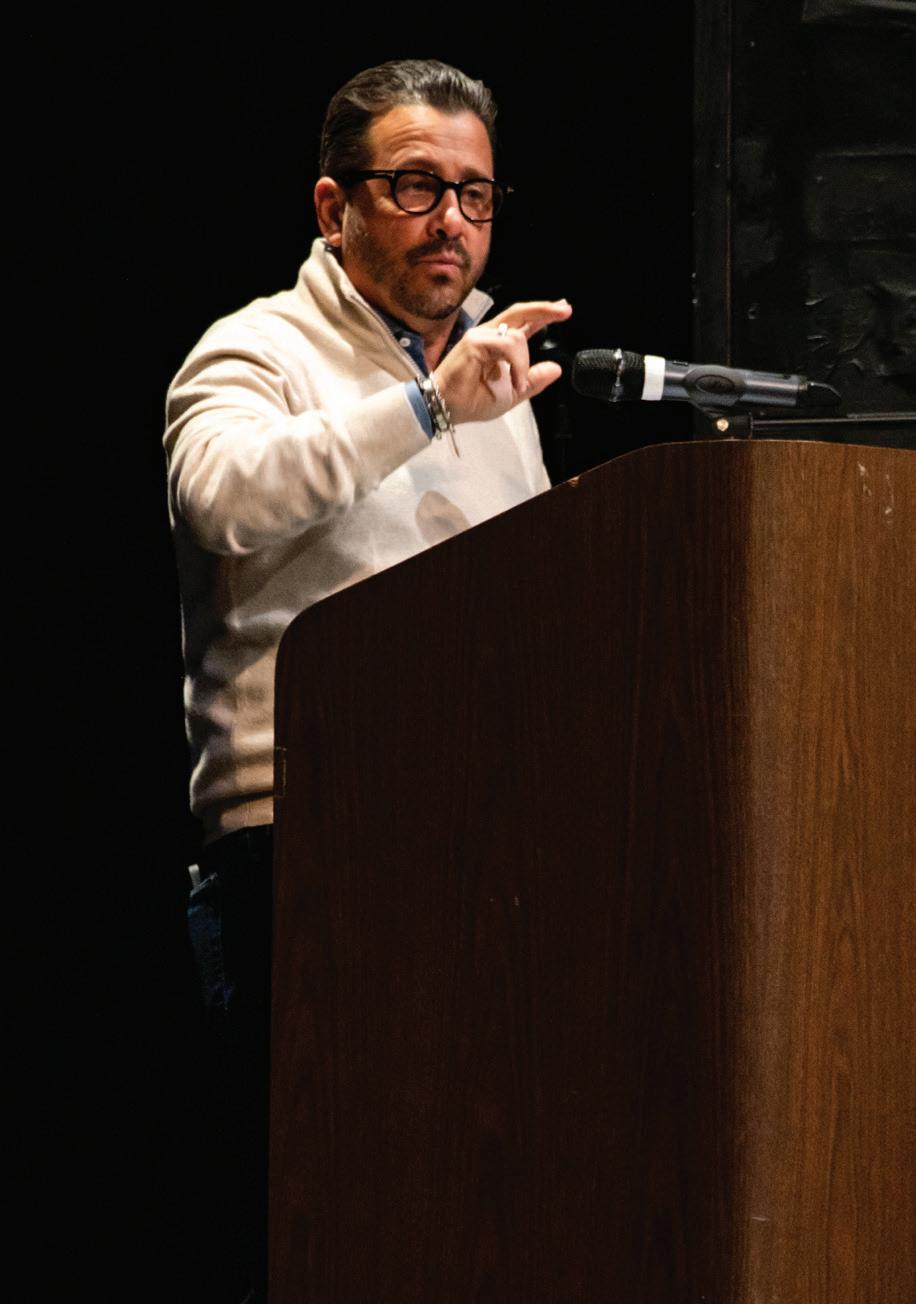
With the success of the collaboration, Stripling explained some of her goals for TCC moving forward, including ramping up promotion for on-campus activities, and trying to keep both the public and the students in the loop by educating them about the numerous opportunities all around them.
“We have all these little brown buildings and until you walk inside and talk to people and really engage, you don’t realize the opportunity here,” she said.
As of now, the program has around 30 students enrolled in classes across NE, South and Connect Campus. Currently, both 101 Studios and Red Productions have placed students on active film sets such as Angel Studios’ “The Chosen,” according to Fousheé.
“The support we’ve received from the industry has been amazing and everyone involved is excited to get TCC students placed on sets around the state,” he said.
One of the key components of this new fast-track approach is the asynchronous and flexible nature, allowing students to select from a variety of bite-sized courses catered to different skill sets, NE president assistant Terri Ford said.
“It’s all still part of the film industry. You want to do the construction or the design of the costume? Then you can take those [courses],” she said. “So, it’s very agile.”
However, that agility isn’t exclusive to just students, as it can also be beneficial to industry partners, Ford said.
“So, let’s say we got a movie that’s coming in and is heavily related to having a lot of makeup and a lot of hair pieces,” she said. “So, then we could really say, ‘Okay, we’re going to start this certificate. We know that this filming is going to come in the latter part of the year or whenever –then we can push that out.’”
The underlying intent behind the collaboration between the various studios and TCC, according to Red Productions CEO Red Sanders, is to build a brand-new environment for upcoming students. “Our goal has been to be a beacon for the creative class here,” Sanders said. “That really means, like, this is a central point for the industry to come together as a community.” Sanders hopes students
who give the course a go will be able to understand not just more about the filmmaking process but more about the growth of the industry within Texas, as well as recognize and seize the new opportunities arising across the state.
“The main thing I hope people learn is that, like, you can very much live and work here in the film, TV and commercial industry,” he said. “There are thousands of jobs here in the industry, and with the growth we’re seeing in it and with unemployment still at historic lows – if you go through a training program like this, you have a much higher degree of getting placed in one of these jobs coming out of it.”
The commission has expanded over the years, seeing more than 20,000 new jobs openings begin to crop up in its wake, alongside garnering a reputation around the state as it continues to gain traction, Film Commission vice president Jessica Christopherson said.
The support we’ve received from the industry has been amazing
Sean Fousheé NE instructor
“So, you know, we are a wellregarded Film Commission in Texas, and we’ve tried to be innovative,” she said. “In what ways can we be innovative? Customer service is one of our main priorities when we have production here in the city. We obviously have more work to do and more room to grow, and that’s part of our collaboration with TCC.”
The underlying intent behind the collaboration between the various studios and TCC, according to Red Productions CEO Red Sanders, is to build a brand-new environment for upcoming students.
“Our goal has been to be a beacon for the creative class here,” Sanders said. “That really means, like, this is a central point for the industry to come together as a community.”
 Alex Hoben/The Collegian
Special guest of the Film Collaborative event David Glasser spoke to the community about the need for new workers in the film industry.
Rama Ajlouni/The Collegian
Alex Hoben/The Collegian
Special guest of the Film Collaborative event David Glasser spoke to the community about the need for new workers in the film industry.
Rama Ajlouni/The Collegian
4 • Wednesday, February 28, 2024
The Fort Worth Film Collaborative and TCC worked together to have an event on NE Campus that connected students with professionals in the production industry. The event featured meet and greet tables, and a panel discussion.
FOUSIA ABDULLAHI campus editor fousia.abdullahi@my.tccd.edu
with her three sons. Before she escaped, she took the key to her future and her downfall.
Violence is a continuous part of the series, as is heavy drug use and some nudity. The level of violence and grotesqueness almost feels over the top, and then you remember it's a show about a former prostitute turned drug dealer, and you realize it's par for the course.
One of the themes in the show is the male characters' misogyny toward women. They undermine their ability to work. Whether it is Griselda's ability to sell drugs or the only female police officer on the force, June Hawkins, played by Juliana Aidén Marti -





nez, ability to solve the case, they don't see women as being capable of being competent.
To be fair, both also had men in their corner who supported them. June had Detective Diaz, Griselda had Dario, bodyguard turned third husband, and Rivi, a foe turned right-hand businessman.
While Griselda wants to be the boss in the drug business, Detective Hopkins wants to be in charge of the case police force, while balancing being a single mom, with Griselda, she tells herself the more money and power she has the more she can protect and provide for her three sons. Each episode is about her reaching a goal and having one of the men in the show ruin it because they see her as being weak. Every time she fought back against the men and won, they made her pay for it by taking something or someone she loved away.
Throughout the show, she stated several times that she was doing this for her sons and wanted to provide them with the best, but her relationship with her sons became more and more strained as she lost with parts of herself. Power can be just as addictive as drugs, and that's what we see in Griselda. She became intoxicated from regaining her power from the men in the show and became even more cruel and ruthless than them.
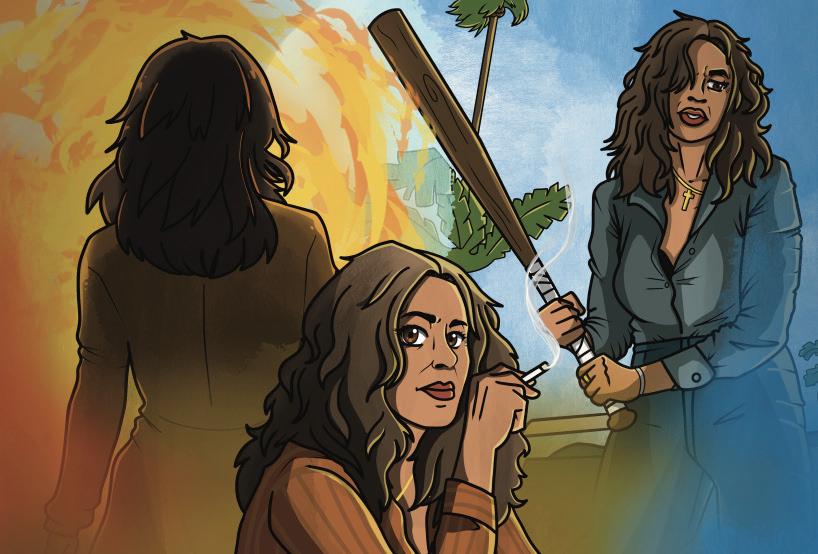
For Griselda, her whole life was about fighting back and proving for herself. Still, due to her habitual use of drugs, the paranoia that came with it and the ruthlessness of the drug trafficking industry, her story ended like many other drug lords.
 Tj Favela/The Collegian
Tj Favela/The Collegian
I would recommend this show, but only if you can handle trauma and violence.
Newest Bob Marley movie expands on life
years after the attack.
OLLA MOKHTAR campus editor
olla.mokhtar@my.tccd.edu
“Bob Marley: One Love” explores the life of late Bob Marley in a new light. Not just the fact that he managed to bring two opposing political parties together, but how it impacted his life.
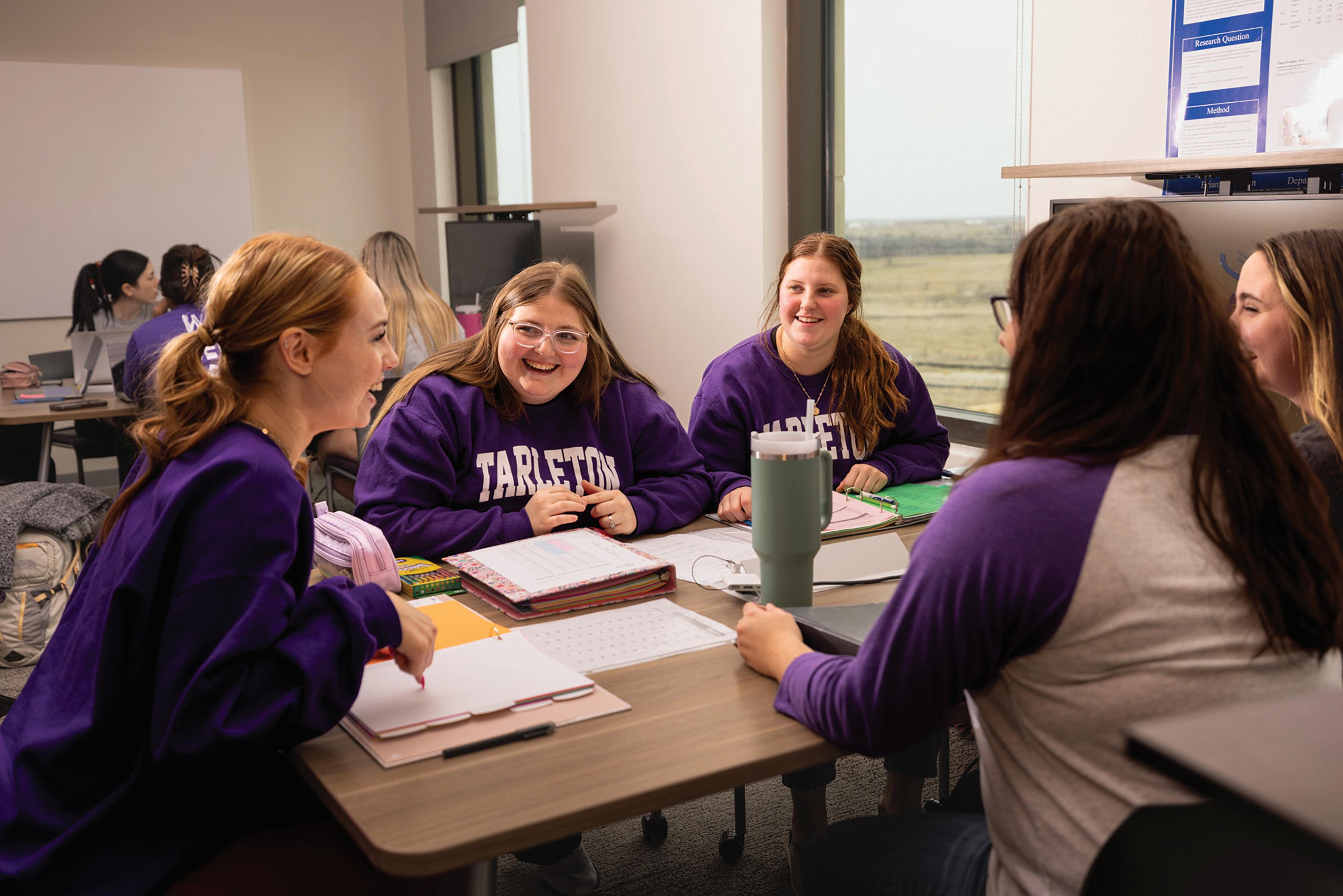


Marley is known for his concert “One Love” he put together to bring peace to the two opposing political parties. There was violent political unrest in Jamaica, particularly in the 1970s where gangs and drugs were plaguing the country.
It was then that Marley decided to host his concert. He recognized that the countryseemed divided and wanted to help resolve the political unrest — but that wasn’t so easy. Right before, he was attacked and shot at his home.
The film was essentially a dramatized documentary that centered on his life before and after this concert and his life on tour. Specifically, when he got diagnosed with a rare type of cancer named melanoma.
A dramatized film with a celebrity like Marley is seldom done well. It’s seldom done considering the deceased’s family members and it is seldom done with respect, at least from what I have seen. This film, however, did none of the above, and Marley’s son made sure of that.
His inclusion was paramount to its success and is especially seen in Kingsley BenAdir’s interpretation of Marley. And thank God for that. Hollywood tends to be insensitive and often inaccurate and it’s honestly very hard to watch. My eyes hurt.
Luckily, the story flowed well.
Ben-Adir perfectly replicated Marley’s mannerisms on and off stage. It was also very impressive of him to replicate the Jamaican accent that way. At first, I had trouble understanding Ben-Adir, but I got used to it 20 minutes into the film. It wasn’t bothersome at all because the accent was so well done it added to portraying Marley more authentically.
What I definitely didn’t expect was the producers including Marley and his wife Rita Marley’s marriage struggles after the first concert. Immediately following it, Marley asked her to take herself and the children to the U.S.. During their time apart, Marley decided to stay in England for two

It was then that he produced his album “Exodus” and where he gained a lot of momentum from European audiences. With the distance came unfamiliarity.
People who aren’t famous often forget that famous people do not in fact have stress-free lives. It was told particularly well with the story telling of his cancer.
He had a wound on one of his big toes and though his wife was upset at him and his touring locations, she said it was water under the bridge. She immediately forgave him.
A dramatized film on a celebrity like Marley is seldom done well.
Olla Mokhtar Campus editor
Even after having children with another woman, she did. I could never but this review isn’t about me.
Aside from his marriage, the film expanded on his adamance to perform even after being exposed to danger and gaining the courage to do it again. He may have fled but he had the urge to go into a studio after being shot for what he wanted to do and Ben-Adir made it even more beautiful to watch.
The film portrayed Marley, his relationship with his country and the pain surrounding what was happening to it with grace. It wasn’t tone deaf at all — in fact the producers saw Marley’s son as a gateway to a beautiful film. One that gave a new standard to dramatized movies, good luck to the ones that come after it.


ENTERTAINMENT MO MOVIE REVIEW VIE “Griselda” tackles misogyny, gender roles This Netflix series follows true story of drug queen Griselda Blanco With This Coupon FOR A FIRST CLASS YOURHOME EDUCATION RIGHT HERE IN FORT WORTH Learn how Tarleton can enrich your educational goals by scheduling a campus tour or attending a virtual information session. Locations available at TCC Trinity River, Tarleton Fort Worth off Chisholm Trail, and Online. We believe in empowering success and forming lifelong connections. Unleash your potential. THIS PURPLE WON’T FADE. Apply today! DO YOU HAVE 24 CREDITS OR MORE? ARE YOU READY TO BECOME A TARLETON TEXAN? At Tarleton State, transfer students find the resources and support they need to finish their education strong. •More than 60 majors •Smooth transfer credit pathways •Affordable tuition •Scholarship opportunities •Diverse, tight-knit community Discover Tarleton
new Netflix limited series “Griselda” brings the female godmother of the Miami drug scene to the small screen. The show is based on a real-life female drug queen in Miami during the ‘70s and ‘80s named Griselda Blanco, played by Sofía Vergara. She was in the cocaine supply business in Medellín, Columbia with her husband and brother-in-law. Early in the series, she faces a betrayal that makes her run to Miami
The
Chiabella James/Paramount Pictures.
Marley: One Love” was released in theaters February 14th.
“Bob
Wednesday, February 28, 2024 • 5
The word without meaning


Students address “wokeness”
XAVIER BOATNER campus editor xavier.boatner@my.tccd.edu
The word “woke” used to have a concise definition, but in recent times, it has been transformed into a shell of its former self.
“Woke” is a term coined by and originally used by African Americans in the early 20th century to describe those who are aware of and acknowledge certain Black social and political philosophies and injustices. With time, however, many people’s definition of the word has changed based on their unique identities – students included.
The term has broken into the world of politics, where both left, and right leaning individuals have used the word with wildly different connotations.

For instance, following his reelection in 2022, Gov. Ron DeSantis said, “We reject this woke ideology. We seek normalcy, not philosophical lunacy. We will not allow reality, facts, and truth to become optional. We will never surrender to the woke mob. Florida is where woke goes to die.”
Some people see going “woke” as a negative and argue that these ideas can become overbearing as they typically are thrust onto people who don’t see eye-to-eye with said ideas, TR student Logan Brossett said.
To some, namely TR student Logan Brossett, “wokeness” means forcing someone else’s beliefs upon someone else, leaving little room for discussion or debate.
“It’s never a conversation, never an actual debate about why we should listen or believe what ‘woke culture’ pushes,” Brossett said. “You either believe it, or you’re considered an enemy which is word for word what I’ve been told by someone who is considered ‘woke.’”

Speaking from firsthand experience, Brossett said the concept of “wokeness” could mean the difference between social acceptance and social rejection and punishment.
“You used to be able to hold your own beliefs as a person, but now if you don’t agree with ‘wokeness’ or other views that align with it, you tend to be viewed as a bad person or can be socially hung for it.”
The concept of “wokeness” has become
for more inclusive and diverse practices. This often occurs in the form of race-swapping characters like Ariel in last year’s “The Little Mermaid” leading to controversy and questions being raised about the legitimacy of it all.
“The discussion over representation focuses on whether modifications, such as characters that switch races or genders, are sincere attempts at diversity or are just attempts at pandering,” Connect student Sabrina Roberts said.
The challenge in branching out and trying to create and adapt characters and ideas that are more reflective of our modern societal standards for the sake of diversifying media can be a difficult line to walk, Roberts said.
“I think the secret is careful writing that steers clear of token characters and gives all the characters the same amount of depth,” she said. “In negotiating the changing terrain of media diversity, the discussion emphasizes the value of authenticity and avoiding the traps of forced portrayal.”
Some believe changing the race or gender of established media isn’t an effective means of making media more inclusive, while others, like NE student Eila Luna, think making such changes have merits that help a wider range of viewers feel seen and represented.
“When Disney came out with more tan characters, as well as introducing different cultures [into its movies], it was a really good feeling of inclusion for me – like in “Coco,” she said. “I imagined kids watching felt the same. I don’t believe Disney has their own agenda on making these changes of color of skin to characters.”
Luna felt that diversifying characters and ideas in media can prove to be entertaining to a new, broad audience while still preserving what made the original ideas so timeless and beloved, however, she argued getting to that point won’t happen overnight.
“I believe people are uncomfortable with seeing more color in entertainment because of the long decades of Hollywood being predominantly white,” she said. “And that of course has to do with America’s history of prejudice and discrimination.”
Luna said as the discussion around what is and isn’t “woke” grows, so do the opinions and perspectives on what the word means and what kind of unique perspectives it brings.
“I believe everybody is ‘woke’ in a




6 • Wednesday, February 28, 2024
How journalism has changed, how we adapt
Being in student press means seeing the different schools you have met through conventions and follow on social media celebrate Student Press Freedom Day, Feb. 22. For the rest of the year, we sit hunched over our computers with faces illuminated by blue light, but for that day we get to be First Amendment toting patriots.
Well, to say we were ALL celebrating the day is an overstatement.
Many of us don’t get the time to post on social media between editing, photography, interning, interviewing, designing and everything else under the student press umbrella. We are busy people.
This business has adapted into the digital age which has caused all of us to read just to how we as journalists send our message.
The interesting part about journalism is the fact that you see it on a small scale everywhere. It may not be the most refined, professional Associated Press Style type of reporting – the guide we use to write – but it’s still done with the same intentions. To spread information. Gossip, in its messy nature, is still the act of sharing and spreading such things. Those TikTok investigators who can figure out where a celebrity’s current location is based on a blurry image of a street sign and the trajectory of the sun can also be a form of journalism if they are taking the time to report back on it.
That said, do not spread harmful gossip and dox people in the name of journalism. Work within reason, folks.
The conversation we have in
VIEWPOINTS
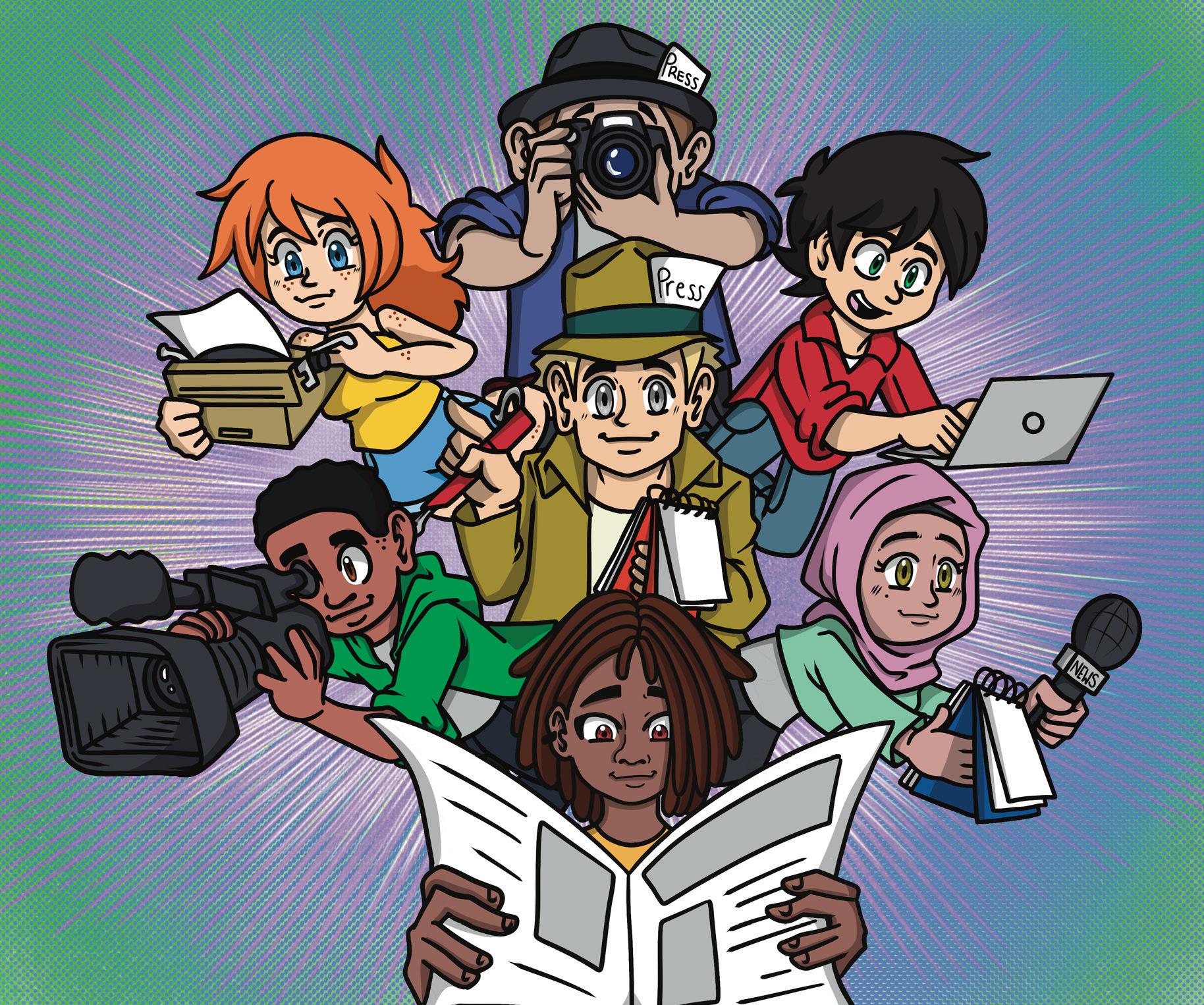
our newsroom about being in student media almost always pertains to what we can do for our community. Just like the other student newsrooms in the country, we are all walking the beat of our schools and want to represent what it means to be a student at this institution.
Student press freedom, in its ever-giving nature, allows us the same kind of freedoms as regular press to explore and exercise our right as American citizens to spread information. This work allows us to give a voice. This is also a privilege. There is
a very valid, legal and moral reason doxing people and spreading gossip is wrong – it cannot be said enough. Do not do those things. It cannot be stressed enough that a student newsroom’s responsibility is to use the platform we made to honor ethics and work responsibly.
It’s up to the student newsroom to decide how we are to spread information, as well. Like previously stated, we are adjusting to a new journalism landscape. It’s a time of growing, and with Vice recently going under and legacy media publications experiencing large staff cuts, it has started to shake the foundation. It all starts in the student newsroom.
If there is anything that has set fire beneath student press, it’s the shift into new age journalism.
While traditional journalism focused on the written story and photo, that is not how people are receiving their news anymore.
It is an ever-growing discussion in the newsroom. We are increasingly seeing the recognition of more visual, digestible news and we have been forced to adapt. This adjustment has been seen with the recent news of Vice Media creating staff cutbacks and a shutdown of Vice.com. Legacy media, as well, like The New York Times and Washington Post are experiencing the same kind of layoffs and there’s whispers in newsrooms of journalism’s growing pains.
What does a student reporter do in the newsroom during this time? We must adapt. We are given the freedom to report, we have to lean into it if we are going to stay afloat.
While these changes take place, it’s important that student media, like The Collegian, is reminded of our responsibility to the audience. We can learn to embrace change and honor the right given to do this work.
Breakups aren’t all bad. They can be absolutely magical Beyoncé belongs in country and deserves her flowers

It’s been one year since the breakup of my first long term relationship. And no, I wasn’t keeping track — I just have an exceptional memory.
There wasn’t anything particularly crazy that led us to breaking up — which oddly felt infinitely worse. In my period of mourning, I wished that they’d cheated, punched an elderly person, screamed at a child. I was grasping at straws to find a reason to hate, and ultimately, get over them. A felony conviction was the key to speeding up the healing process. But this was a largely ineffective tactic because they weren’t prone to crime or elder abuse.
What actually helped was a quote from my favorite comfort movie “Set It Up.” Zoey Deutch and Glen Powell’s characters are trying to get their bosses together in hopes that it’ll reduce their workload. Their recent attempt ended in disaster, with Powell’s character worried that they hate each other. Deutch’s character then says that “hate isn’t the opposite of love, it’s indifference.”
I realized my “hate” derived from the love that existed at one point. “Hate” allowed them to stay in my mind — albeit negatively. So, I worked to be indifferent. Now, my memories of the relationship feels

EDITOR-IN-CHIEF Hope Smith
MANAGING EDITOR Nina Banks
PHOTO/MULTIMEDIA EDITOR Alex Hoben
ILLUSTRATORS Tj Favela
like they’ve been planted there. At one point in my life, this person consumed my thoughts day and night. Now, I largely think about myself and TikTok edits. And my therapist thinks that’s wonderful.
I’m also extremely lucky in the fact that I have wonderful friends who supported me post-breakup with shopping trips, dinners and confirming that my suspicions that it was weird when they did that. It probably would’ve taken me much longer and seven extra pints of Ben and Jerry’s.
When I told a friend that I was writing about the paper anniversary of my breakup, she turned with her eyes wide and said, “Really? It’s only been one year? It’s felt like ages.”
Breakups are a magical thing. I feel like I’ve had two years of growth crammed into the past year. I’ve developed different music taste, made lasting friendships across the country, got a new job and am so much better at doing winged eyeliner. I think everyone could use a breakup or two.
As my therapist constantly reminds me, these are the years to be selfish. Spend the extra money on guac and don’t continue to do things that don’t bring you joy. Job, partner or that new dish at that Thai fusion restaurant that you can’t bring yourself to love. Get your usual Pad Thai and keep it pushing.
I love love. In all its forms — platonic, familial, romantic or self. There have been minor flirtations from then to now, but being single is fun. I don’t feel compelled to be in a relationship right now, and single Nina is very fun.
I think I’m going to stick with her a little longer. I’m not ready to get back in the game all-the-way, but if the right person hands me the bat, I’ll take a swing. I’m talking to you Shohei Ohtani.
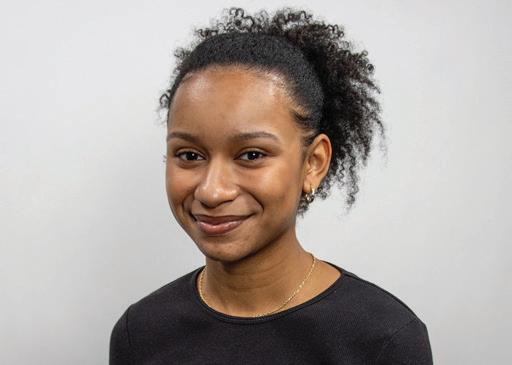
Beyoncé deserves to be embraced by the country music industry. The Houston native isn’t dipping her toes in a genre she doesn’t belong in. As Taylor Crumpton, music, pop culture, and politics writer from Dallas said, “Country music is Black. Country music is Mexican. Country music is Indigenous.”
Sitting in the passenger seat of my friend’s car, I swayed my head to the newly released songs, “Texas Hold ‘Em” and “16 Carriages,” both a part of Beyoncé’s upcoming country album. I was eager to listen after hearing content creators set up their phones and make it very clear that Beyoncé’s tracks are very much so, country.
I’ll be honest – I don’t think there’s anything Beyoncé can’t do. So naturally, I didn’t see why anyone would be counting her out of the genre in the first place. Then I remembered. Putting the artist’s talent aside, for many Americans, the current image associated with the country music industry is white.
Black musicians have long created country music. They’re trailblazers of the genre. Artists such as Ray Charles and DeFord Bailey had significant impact in the country music sphere. According to the Country Music Hall of Fame and Museum, Bailey was even one of the first performers to be introduced on Nashville radio station WSM’s
Grand Ole Opry.
Furthermore, Black women have deep roots in country music and have fought to be accepted in the industry, according to PBS. Rissi Palmer, a Grammy-nominated country music artist, struggled to navigate the world of country in Nashville. PBS explains that sometimes the problem were her lyrics and other times it was her hair.
And Linda Martell, legendary country music artist, was the first Black woman to perform on the Grand Ole Opry’s stage. Tina Turner is also a prominent name to be mentioned.
In the Forbes article “Beyoncé’s New Songs Aren’t Getting Played On Country Radio – Despite Streaming Success,” staff member Mary Whitfill Roeloffs wrote that a radio station in Oklahoma wouldn’t play Beyoncé’s new songs because they are a country music station. The station, 100.1 KYKC, later explained that they simply didn’t know Beyoncé had released new music. As a country music station, I’m not sure that’s plausible. Ultimately, regardless of the station being aware of her newly released music, was it unfathomable that the record breaking, Grammy-award winning star could create country music?
Considering the industry’s history, why do some have this idea that country music is “white?” If people are just mad that Beyoncé is able to showcase her talent regardless of the genre of music, they should just say that. She’s beautiful, talented and has every right to release a country album if she wants to. Plus, go listen to both songs, and then come look me in the eyes and tell me that they’re not country songs.
If she wants to switch out all of her silver for a cowboy hat, just be happy that she’s releasing a new album soon and move on.
Martinez
PHOTOGRAPHERS/MULTIMEDIA
The Collegian is a weekly student publication serving the Tarrant County College District. Editorial statements and advertisements do not necessarily reflect the opinion of the TCC administration. Letters to the paper should be 150 words or less, free from libel and poor taste and include the writer’s Colleague ID or telephone number (the numbers will not be published). Letters may be brought to The Collegian office (NCAB 1124A, NE Campus) or mailed to: The Collegian 828 Harwood Road Hurst, TX 76054 Office: 817-515-6391 email: collegian.editor@tccd.edu TCC is an equal opportunity institution that provides educational and employment opportunities on the basis of merit and without discrimination because of race, color, religion, sex, age, national origin, veteran status or disability.
CAMPUS EDITORS Xavier Boatner Fousia Abdullahi Huda Qureshi Keyla Holmes Olla Mokhtar DESIGNERS Jerry Swinney Dominick
Rama Ajlouni Ryan Cutrer
ADVERTISING COORDINATOR Abel Hailu
EDITORIAL
Tj Favela /The Collegian
Meet the Staff
Letter Policy
@tccthecollegian • collegian.tccd.edu ProfeSSional Staff ADVISERS Chris Whitley Lori Dann PRODUCTION MANAGER Stacy Luecker
Wednesday, February 28, 2024 • 7 OPINION
NINA BANKS Managing editor nina.banks@my.tccd.edu
KEYLA HOLMES campus editor keyla.holmes393@my.tccd.edu

8 • Wednesday, February 28, 2024 THE UNIVERSITY OF TEXAS AT DALLAS University in North Texas 1 - Forbes Check us out at The College Tour solar.utdallas.edu/TheCollegeTour ADVERTISEMENT















 Alex Hoben/The Collegian
Special guest of the Film Collaborative event David Glasser spoke to the community about the need for new workers in the film industry.
Rama Ajlouni/The Collegian
Alex Hoben/The Collegian
Special guest of the Film Collaborative event David Glasser spoke to the community about the need for new workers in the film industry.
Rama Ajlouni/The Collegian




 Tj Favela/The Collegian
Tj Favela/The Collegian


















